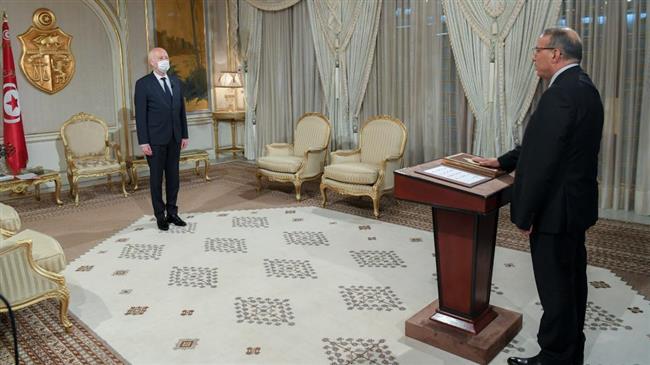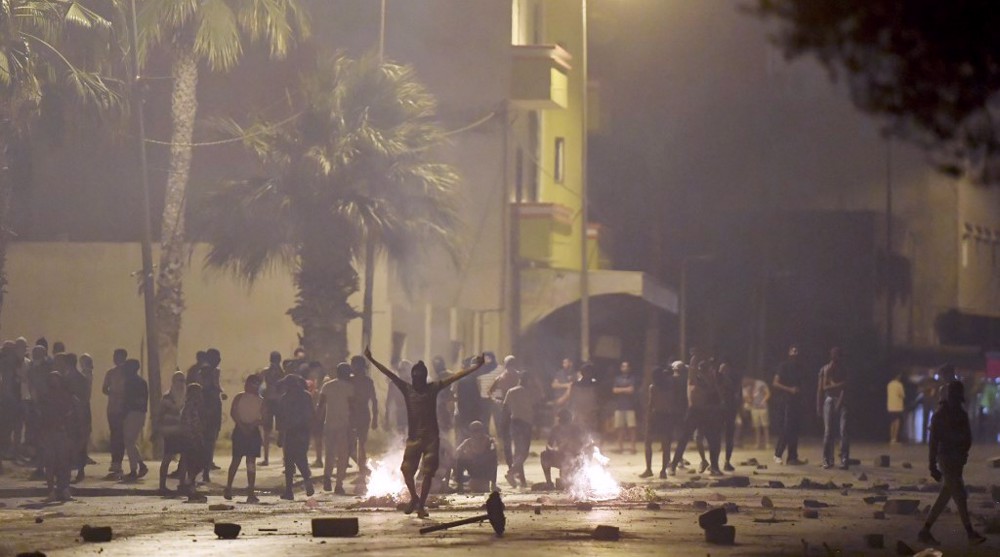Tunisia president names new interior minister after sacking PM, parliament
Tunisian President Kais Saied has appointed a new interior minister days after seizing control of the government and freezing the parliament, pledging to protect civil rights and respect freedoms.
Saied appointed former national security adviser Ridha Garsalaoui on Thursday to run the country’s Interior Ministry and also vowed to implement the constitution and safeguard people’s rights and freedoms.
"I tell you and the whole world that I am keen to implement the constitutional text and keen more than them on rights and freedoms," Saied said. "No one has been arrested. No one has been deprived of his rights, but the law is fully applied.”
The development comes as the North African country is awaiting the appointment of a new prime minister and the announcement of a plan to find a way out of the political and economic crisis.
Tunisia, the cradle of the Arab Spring protests a decade ago, was thrust into a constitutional crisis on Sunday after Saied sacked Prime Minister Hichem Mechichi and suspended the country’s parliament for 30 days.
Saied said he would be running the country’s executive affairs in cooperation with a premier of his own choosing in the wake of violent protests across the North African nation over the government’s handling of the COVID-19 pandemic and the country's ailing economy.
Saied’s opponents and detractors labeled the decision as “a coup d’etat” against the 2011 revolution that ousted former Western-backed ruler Zine El Abidine Ben Ali, as well as against the country's constitution, calling for street protests in denunciation of the move.
The Tunisian president on Tuesday dismissed more officials amid the political crisis, including Defense Minister Ibrahim Bartaji and Hasna Ben Slimane, the acting justice minister.
Saied has imposed a night curfew for a month after clashes between the supporters and opponents of his dismissals left several people injured.
Years of paralysis, corruption, declining state services and growing unemployment had agitated many Tunisians on their political system before the COVID-19 pandemic smashed the economy last year and infection rates surged this summer.
The Tunisian president and parliament were both elected in separate popular votes in 2019 while the prime minister took office last summer, with Saied swearing to overhaul a complex political system plagued by corruption.
Deposed PM denies being beaten
On Thursday, Tunisia's deposed Prime Minister Mechichi denied a report that he had physically been assaulted the night before he agreed to resign.
Media reports on Wednesday had said that Mechichi was beaten up after refusing to step down on Sunday.
"I categorically deny that I was subjected to violence," the Maghreb Street newspaper quoted the former prime minister as saying.
The Maghreb Street also cited comments by Mechichi denying reports that he had been prevented from making statements and placed under house arrest.
"I wrote the statement with peace of mind, and I was at home at the time," it reported him as saying in reference to his resignation statement. "And most importantly, I wrote it with complete conviction. Unfortunately, there are no limits to rumors and it seems that they will not stop."
The paper also denied rumors that the premier had been forced to resign at gunpoint.
One report had said there were Egyptian security officials in the palace at the time, who had been advising Saied throughout.
It said the Egyptian officials had been offered by Egyptian President Abdel Fattah el-Sisi and with the full support of Mohammed bin Zayed, the crown prince of Abu Dhabi.
The outgoing prime minister issued a statement on Monday in which he said he could not be "in any way a disruptive element or part of the problem that complicates Tunisia's situation".
Dec. 25: ‘Axis of Resistance’ operations against Israeli occupation
Lavrov warns West against challenging Russia's resolve to defend interests
VIDEO | Press TV's news headlines
Yemen parl. condemns ‘shameful’ silence of Arab states on Israeli crimes in Gaza, Syria
VIDEO | Iran’s Christians mark Christmas with hopes for Gaza resolution
VIDEO | Syrians take to streets nationwide against shrine desecration; HTS militants fire on protesters
IRGC: Yemeni attacks change Israel’s calculations amid regime’s joy over Syria
Hamas calls for action against Israeli settler incursions into al-Aqsa Mosque












 This makes it easy to access the Press TV website
This makes it easy to access the Press TV website